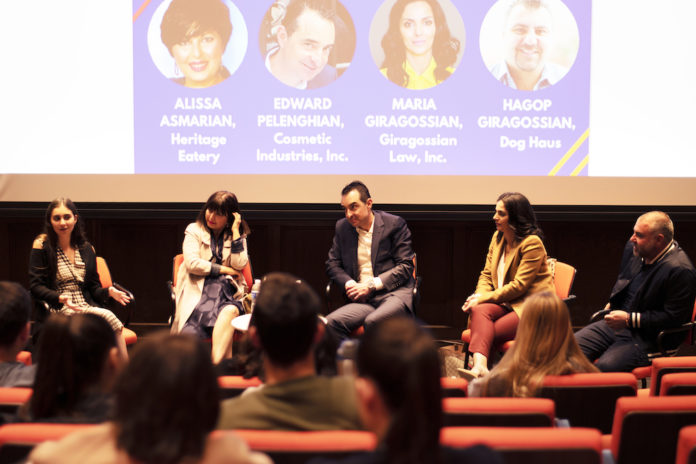
Armenian Students Association (ASA) and Oxypreneurship hosted an Armenian Entrepreneurship Panel Nov. 14, bringing together four local entrepreneurs: Alissa Asmarian, Edward Pelenghian, Maria Girsagossian and Hagop Giragossian. Serena Pelenghian (junior)* and Emily Davis (junior) moderated the panel. Vahe Akopyan, ASA committee chair, said the high number of Armenian entrepreneurs in LA provided a good opportunity to forge connections within the Armenian community.
“We decided that it’s a good idea to have some of them come over and have a talk about how they got to be where they are, especially being a minority,” Akopyan said. “How they took all the steps, especially [because] some of them are immigrants, some of them are second generation. It’s a little bit tough being in that situation.”
Asmarian is the founder of Heritage Eatery, a restaurant that pays homage to Amsarian’s Armenian heritage and puts a spin on traditional Armenian food, such as the dish kamats matsoun. Edward is the president of Cosmetic Industries, Inc. which is the largest nail polish manufacturer in the U.S. Maria has been an attorney for the past 11 years, practicing criminal defense law before opening her own practice after the birth of her son. Hagop is in the restaurant industry, running Dog Haus with two other business partners; they now have 36 restaurants in 10 states, where they serve hot dogs, burgers and sausages.
ASA’s president Lara Minassians said the panel provided an opportunity to introduce students to the speaker’s unique business experiences.
“We were hoping this panel would offer students good insight into successful niche companies, and people who have defined their own success through pursuing their passions,” Minassians said via email. “I think each panelist brought a very unique perspective, which was great.”
Akopyan also said the panel furthered ASA’s practice of connecting with the larger Armenian community.
“We don’t just focus on our ASA,” Akopyan said. “Of course, we have all the other ASAs from all the other schools, and we have a big network. So this is kind of a way of networking.”
Davis asked the group to talk about lessons that they have learned through their business experience. Dog Haus was not the first restaurant Hagop started. He said the lessons he learned through the failures of his first restaurant allowed for the success of Dog Haus. Hagop made sure to start smaller with Dog Haus, making it easier to manage.
Edward said it is important not to simply rely on one’s formal education. According to Edward, is important to combine any education one has with a strong work ethic and drive.
“If you have the will, you can do anything,” Edward said.
Asmarian agreed with with Edward’s point, saying that passion is a necessary part of running a business. Asmarian said that Heritage Eatery’s food educates non-Armenians about Armenian culture.
“Be proud of your business, and it will get you places,” Asmarian said.
Davis asked the panelists to speak about how their Armenian identities have influenced their business practices. Hagop said that the Amernian community is incredibly supportive of Dog Haus, especially because they know that one of the business partners is Armenian himself. Maria said that being bilingual allows her to connect with more clients through her law practice.
“You have to feel comfortable with yourself and who you are,” Maria said.
Asmarian said when she was opening Heritage Eatery, a friend raised a concern about describing the menu in Armenian terms, saying that it might deter non-Armenians from eating at the restaurant. But Asmarian did not hide the menu’s Armenian influence, instead embracing it and promoting her culture.
The panel then began to discuss why they have chosen their specific careers. Edward said it is important to first identify what field one wants to be in, and then follow that up by setting oneself apart from the others in that field. Edward said he knew he wanted to go into manufacturing of any kind. He ultimately found his niche in nail polish manufacturing, despite not having prior experience in cosmetics.
Maria said her love of people and stories made practicing law the perfect career for her. She said opening up her own private practice also pushed her to learn how to run a business. According to Maria, running the business aspect of her private practice is an entirely different experience when compared to being an attorney.
“It’s not enough to love what you do,” Maria said. “You also have to be smart about what you do.”
Hagop said that the first job he had out of college was in sales, and he had a very negative experience with his boss at the time. He said that this experience pushed him to want to be a better boss for his employees, and if he had not had that initial negative experience, he may never have gone into a managerial position. It is important that a boss creates a positive work experience for their employees, according to Hagop.
“I don’t like to tell people that they work for me,” Hagop said. “I tell them that we work together.”
The panel ended with each speaker giving advice on how students can become leaders. Asmarian said it is important to do one’s research, while Edward said branding is a vital part of business. Maria said when you are your business — as she is with running her own law practice — you are your brand.
“Be who you are, be genuine, and that comes through,” Maria said.
Minassians said she believed ASA achieved its vision for the panel, as each speaker’s unique perspective provided valuable advice for the attendees.
“I think the vision was achieved and went beyond our expectations because the wisdom they shared was very useful to us Oxy students, no matter what major,” Minassians said. “They really inspired me and the other students.”
*Serena Pelenghian is a staff writer for The Occidental.
![]()



































